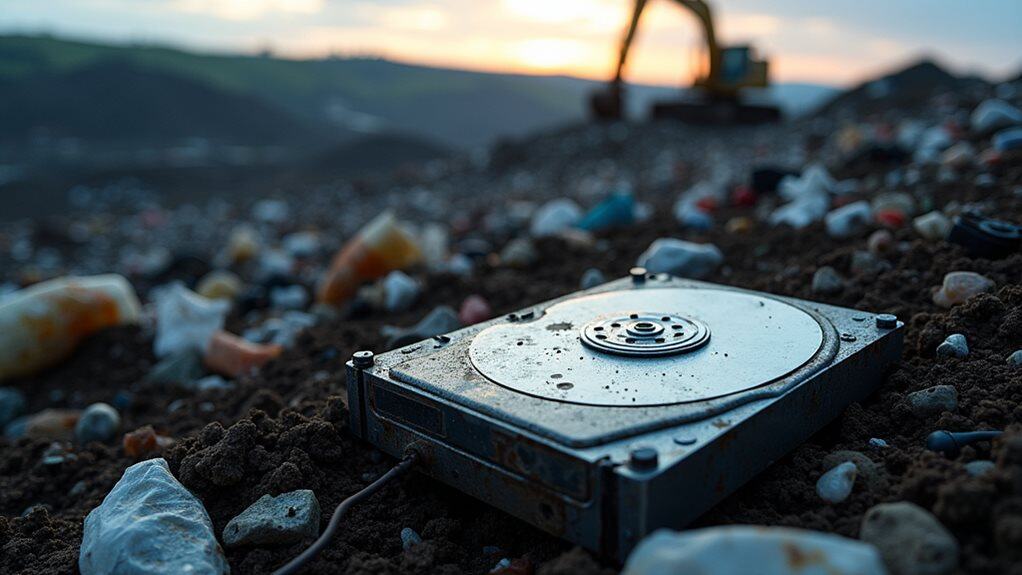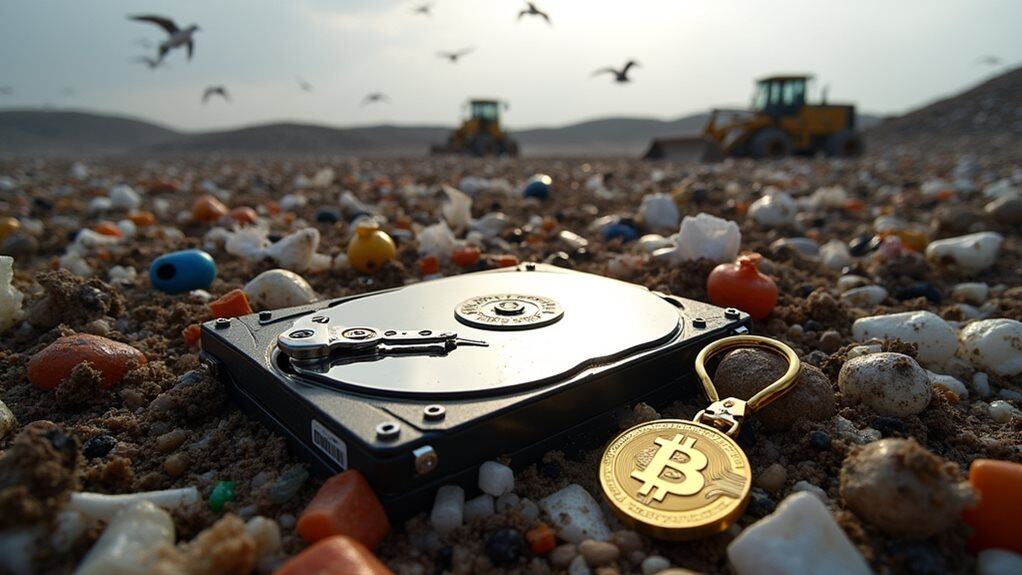You’re looking at one of digital history’s most expensive mistakes: $742 million worth of Bitcoin buried in a Welsh landfill since 2013. James Howells accidentally discarded a hard drive containing 8,000 Bitcoins, which his ex-partner threw away during a cleanup. Despite securing hedge fund backing and offering Newport City Council 25% of proceeds plus £52.5 million for the community, the council refused excavation citing environmental concerns. His High Court case was dismissed due to considerable delays and lack of realistic success prospects, leaving the fortune permanently entombed beneath tons of accumulated waste. The complete legal defeat highlights how regulatory barriers can make even valuable digital assets unattainable.

A $742 million Bitcoin fortune remains buried beneath over 1.4 million tonnes of waste in a Welsh landfill, creating one of cryptocurrency’s most expensive disposal mistakes.
James Howells accidentally discarded a hard drive containing keys for approximately 8,000 Bitcoins in 2013 when his ex-partner threw it away. The device now lies somewhere in Newport’s Docks Way landfill, where waste has accumulated for over a decade. Howells became an early adopter of Bitcoin in 2009, just months after the cryptocurrency was first implemented.
You might wonder why no one’s digging it up. Newport City Council has consistently refused all excavation requests, citing environmental concerns and logistical challenges as primary reasons for their decision.
Howells didn’t give up easily. He secured backing from a hedge fund and assembled a team of data recovery specialists to support his ambitious search plan. The proposed excavation would use waste records to identify the hard drive’s location and take an estimated 9-12 months to complete.
The council initially seemed open to returning the device if found, but their stance hardened over time. They now maintain that buried assets are considered rubbish and therefore their property under current law.
Howells made generous offers to sweeten the deal. He proposed giving Newport City Council 25% of the proceeds and donating £52.5 million directly to the people of Newport. When he made these offers, the Bitcoin was valued at approximately £200 million.
All offers were refused. The council remained firm in their position despite the fortune’s value climbing to nearly $780 million today.
Legal action seemed like the next logical step. Howells filed a High Court case seeking either access to the landfill or financial compensation for his losses.
The court dismissed his case, ruling that it had no realistic prospect of success. The judge cited the considerable delay between the original loss and the legal action as a key factor in the decision.
The excavation would cost millions of pounds and face enormous logistical difficulties. Environmental regulations add another layer of complexity to any potential recovery effort. The story has attracted significant media attention as Howells appeared on various platforms to discuss his situation.
Today, the Bitcoin fortune remains buried, and Howells’ legal options appear limited. The 12-year quest has ended in defeat, leaving one of history’s most valuable pieces of digital trash permanently lost.
Frequently Asked Questions
What Security Measures Could Have Prevented This Bitcoin Wallet Loss?
You could’ve prevented this wallet loss through multiple backup strategies and secure storage methods.
Creating encrypted digital copies of your private keys and storing them across separate locations would’ve provided redundancy.
You should’ve used offline storage methods like metal seed phrase cards in fireproof safes.
Additionally, you could’ve implemented split storage by dividing recovery phrases between secure locations, guaranteeing you’d never lose complete access to your Bitcoin wallet.
How Many Other Similar Cases of Lost Bitcoin Fortunes Exist?
You’ll find numerous documented cases of lost Bitcoin fortunes beyond individual incidents.
Stefan Thomas can’t access 7,002 BTC worth over $700 million due to forgotten passwords.
QuadrigaCX’s bankruptcy left 26,350 BTC inaccessible, while Mt. Gox’s hack wallet holds 79,957 BTC that’s never been recovered.
Satoshi’s wallets contain approximately 1 million BTC, inactive since 2010.
Experts estimate about 20% of Bitcoin’s total supply is permanently lost through various circumstances.
Could Quantum Computing Eventually Help Recover Lost Bitcoin Private Keys?
You’ll likely need to wait years before quantum computing can recover lost Bitcoin private keys.
Current quantum computers lack the millions of error-corrected qubits required to break Bitcoin’s 256-bit encryption using Grover’s algorithm.
However, once quantum computers can crack private keys faster than Bitcoin’s 10-minute block time, they could potentially recover lost fortunes.
This advancement would fundamentally threaten Bitcoin’s security and could collapse trust in the cryptocurrency’s value.
What Environmental Impact Did the Landfill Search Operations Cause?
You’ll find that the landfill search operations haven’t actually caused any environmental impact yet.
The proposed excavation never received approval from Newport City Council, so no digging has occurred at the Docksway landfill site.
You can see that officials consistently rejected Howells’ requests due to environmental concerns about toxic gas release, groundwater contamination, and soil disturbance.
The search remains blocked by regulatory barriers, leaving the site undisturbed.
How Do Cryptocurrency Inheritance Laws Apply to Lost Digital Assets?
Cryptocurrency inheritance laws create complex challenges when you’re dealing with lost digital assets.
You’ll face jurisdictional variations in legal recognition, making recovery difficult across different regions. Without private keys, you can’t access lost assets, even with proper legal documentation.
Estate taxes may still apply to lost cryptocurrencies, depending on your local regulations.
You’ll need thorough estate planning that includes digital asset inventories and appointed digital executors to manage inheritance risks effectively.





